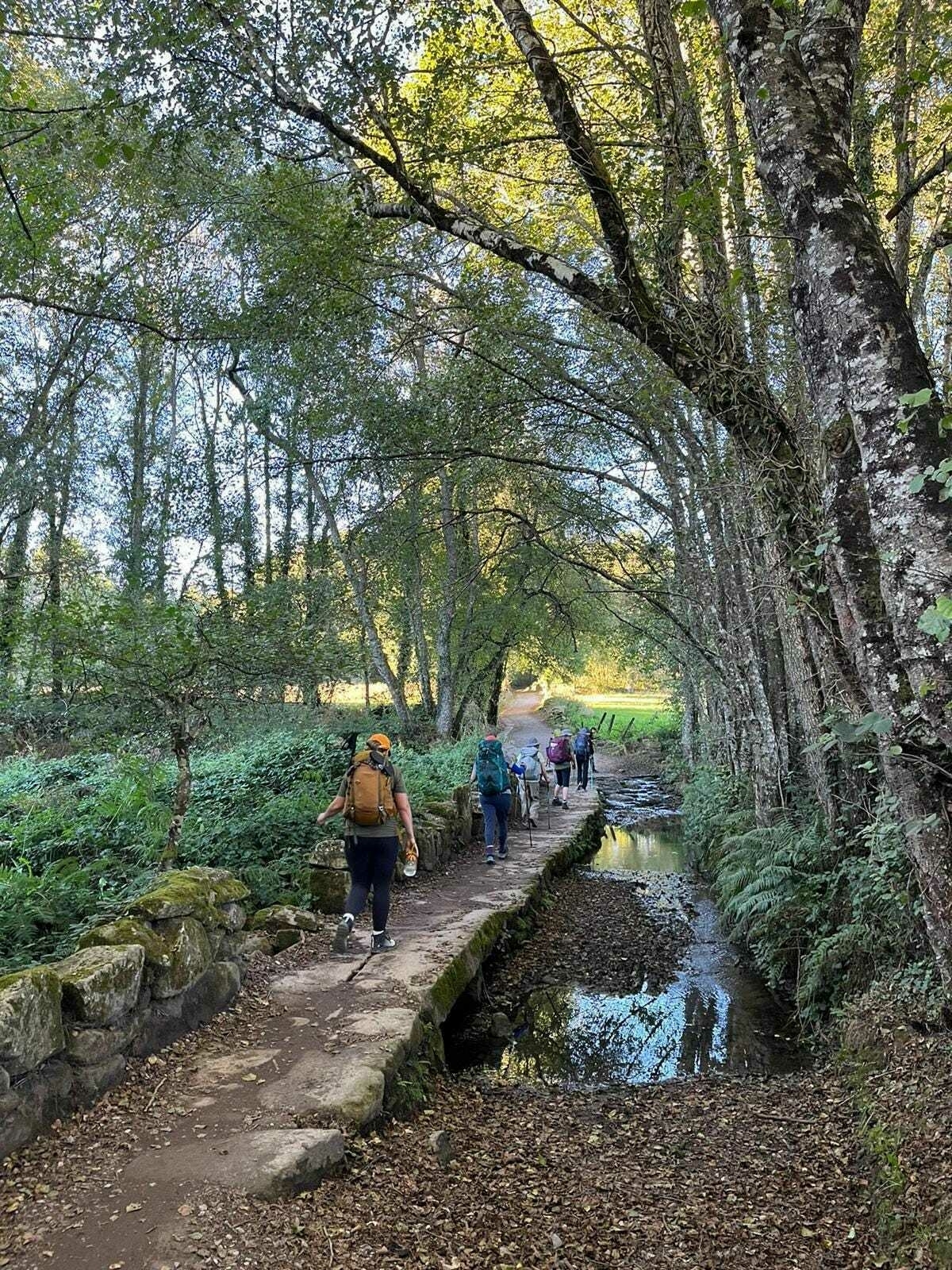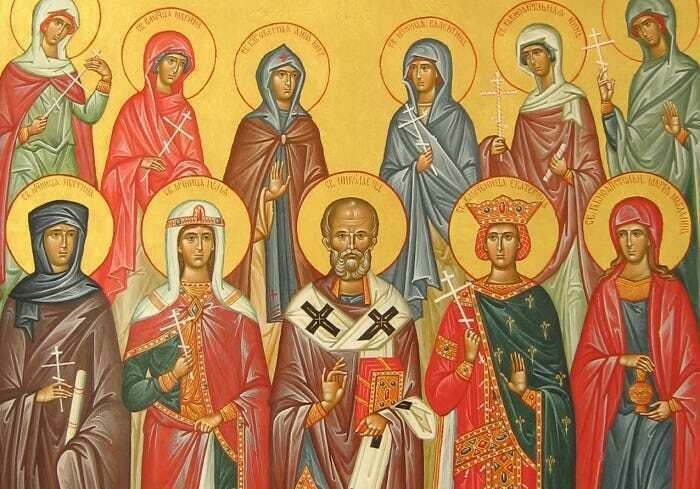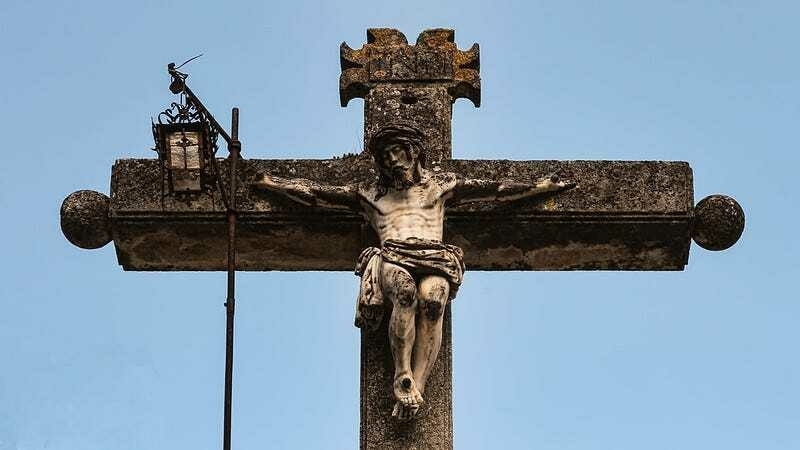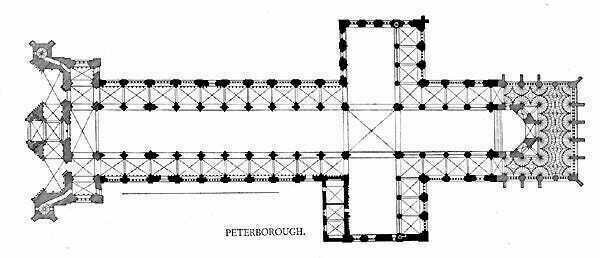Rhythms of Habit
St. James of Jerusalem
October 23
While this is not your standard Rhythms of Habit email, I wanted to send out a quick note today about St. James of Jerusalem, along with a request.
The Request
Please send me your questions about the Church Calendar! It has been a joy hearing from many of you as you enter more deeply into following the church calendar, and I would love to know what questions you have along the way. Simply reply to this email, with your questions and I will do my best to get them in the queue. (Up next: Liturgical Colors!)
A Note about St. James
St. James of Jerusalem was the brother of our Lord, a critical early leader in the Church, and the first of the Apostles to be martyred. He wrote the Epistle of St. James, and was considered “a pillar” among the Apostles.
But today’s note is not so much about James himself, but rather a practice that has emerged in his honor over the centuries.
The Camino de Santiago is a pilgrimage across much of Western Europe that ends at the Cathedral of Santiago de Compostella. It is here that (at least some of) the remains of St. James are buried.
The whole concept of a pilgrimage deserves its own book, as does the Camino itself. But I mention them here in Rhythms of Habit today for one particular reason: my wife recently returned from her own two week pilgrimage on the Camino, which means that James and the pilgrimage in his honor have been on our minds much of the past several months.I hope my wife (who probably reads these emails??) will one day write about her own experience on the Camino, but in the meantime you can click here to read how I tried to adopt a pilgrim mindset while caring for our kids at home in her absence.
So on this day set aside to commemorate St. James of Jerusalem, I leave you with two things: a prayer of thanksgiving for the life and work of James, and a habit to adopt.
O gracious God, we remember before you today your servant and apostle James, first among the Twelve to suffer martyrdom for the Name of Jesus Christ; and we pray that you will pour out upon the leaders of your Church that spirit of self-denying service by which alone they may have true authority among your people; through Jesus Christ our Lord, who lives and reigns with you and the Holy Spirit, one God, now and for ever. Amen.
Habit to Adopt: Pilgrimage
At its core, a pilgrimage is an intentional walk for a specific purpose. It can be a retracing of significant moments in the life of Christ—like the Via Dolorosa in Jerusalem—or a walk around your block for the purpose of praying about an upcoming decision.
A pilgrimage is a practical means of using time and place to honor important intentions.
Here is a largely practical example from my own life: I have started to park my car farther away from the entrance to my school in order to have three or four minutes of silence before and after work. Sometimes this silence is simply enjoyed as a moment where I am not needed ... and other times it is spent praying. And, of course, plenty of times it is spent thinking about the weekend’s schedule or the latest Tottenham match.
But this tiny pilgrimage, experienced over the course of many months and years, is no doubt shaping me and my interactions with those I care for.
So, talk to my wife if you want to hear more about the Camino! But also look for ways to take your own tiny pilgrimages here and now.
Every Friday is Good Friday
The seven day week as a microcosm of the Church Calendar.
The Church Calendar, beginning with the first Sunday of Advent and concluding with the Feast of Christ the King, is an intentional re-living of the life of Christ year after year.
In Advent we anticipate his Incarnation that we celebrate throughout Christmas. In Epiphany we recognize the many ways he revealed his true nature throughout the Gospels. In Lent we enter with him into the period of fasting in the wilderness. Holy Week is a slow, purposeful walk through the final week of his life. Easter—the longest of the Holy Seasons!—is a feast celebrating the resurrection of our Lord.
To follow the Church Calendar is to re-live the life of Jesus every year of your life.
But there are some things worth doing not just every year, but every week.
For as long as the Church has been the Church, Christians have used the natural rhythm of the seven day week to be formed—week after week—increasingly into the image of Jesus.
The seven day week serves as a microcosm of the Church Year.
So what is the seven day rhythm of the Christian week?
The Didache is a first century text that describes many areas of life for at least one early Christian community. Here is what it says about fasting:
But let not your fasts be with the hypocrites, for they fast on the second and fifth day of the week. Rather, fast on Wednesday and the Preparation (Friday).
In this specific church manual, the reality that Christians were regularly fasting was understood. The Didache simply gives a prescription for when to do so: Wednesdays and Fridays.
Why?
It was on Wednesday that Judas planned the betrayal of Jesus, and it was on Friday that he was crucified.
Throughout the ages, certain days of the week have been given special treatment by Christians, and these days often come with a prescription of sorts.
Not every day of the week has a set purpose or practice. The same is true of the Church Year, too. There are Holy Seasons and Holy Days, but there are plenty of ordinary days throughout the year also.
After all, if every day is special … then no day is really special.
Habit to Adopt: Over the centuries, Wednesdays, Fridays, Saturdays, and Sundays have held a special place in the lives of the faithful. This year, pick one of the days below to specially observe on a weekly basis.
Wednesdays: Fast. This can be a skipped meal, or fasting from a particular type of food, like meat, sugar, or coffee. Or you could avoid eating all day. As you fast, keep in mind that one benefit of fasting is that you are strengthening your moral “no” muscle, or what the ancients called Temperance. As you say “no” when it doesn’t really matter—skipping a meal, for example—you are increasing your ability to say “no” when it matters most.
Fridays: Fast, and remember the Cross. Similar to Wednesday, Christians have often fasted on Fridays. This is most culturally noticeable throughout the season of Lent, when the McDonald’s Filet-o-fish returns to prominence. A collect for Fridays is below, and would be a wonderful prayer to say throughout your Fridays.
Almighty God, whose most dear Son went not up to joy but first he suffered pain, and entered not into glory before he was crucified: Mercifully grant that we, walking in the way of the cross, may find it none other than the way of life and peace; through Jesus Christ our Lord. Amen
Saturdays: Rest, and prepare for Sunday Worship. This could take the form of a day-long rest—like fasting from a smartphone or screens—or it could be a simple act of preparation, like reading the lectionary texts for Sunday’s sermon or setting out clothes and making a simple breakfast ahead of time in order to make the “get ready for Church” routine a little less hectic. A collect for Saturdays is below, and would be a wonderful prayer to say as you prepare.
Almighty God, who after the creation of the world rested from all your works and sanctified a day of rest for all your creatures: Grant that we, putting away all earthly anxieties, may be duly prepared for the service of your sanctuary, and that our rest here upon earth may be a preparation for the eternal rest promised to your people in heaven; through Jesus Christ our Lord. Amen.
Sunday: Celebrate the Resurrection, and launch into the week. While there are countless biblical topics covered in Sunday services and classes, the Sunday gathering of the faithful is chiefly a celebration of the Resurrection of our Lord. Similarly, it is our weekly celebration of the Resurrection that equips us for the week ahead. Two prayers help capture these things. The first is a general collect for Sundays, and the second is the Post Communion Prayer: the final words prayed by the congregation before the service ends. Whether your church says these prayers or not, consider doing so yourself as you seek to more fully celebrate Sunday.
God, you make us glad with the weekly remembrance of the glorious resurrection of your Son our Lord: Give us this day such blessing through our worship of you, that the week to come may be spent in your favor; through Jesus Christ our Lord. Amen.
Eternal God, heavenly Father, you have graciously accepted us as living members of your Son our Savior Jesus Christ, and you have fed us with spiritual food in the Sacrament of his Body and Blood. Send us now into the world in peace, and grant us strength and love and serve you with gladness and singleness of heart; through Christ our Lord. Amen.
St. Michael and All Angels
September 29: A celebration of heavenly beings in an overly-materialistic world.

In the preface to his infamous Screwtape Letters, C.S. Lewis notes the following about our attitudes towards heavenly beings.
There are two equal and opposite errors into which our race can fall about the devils. One is to disbelieve in their existence. The other is to believe, and to feel an excessive and unhealthy interest in them. They themselves are equally pleased by both errors and hail a materialist or a magician with the same delight.
On the one hand, ours is an age that values the physical and material world around us. To the materialist, the world is what you can experience and observe: atoms, molecules, nature, etc. This world is explained in scientific terms; we hold things to be true if we can empirically verify them in a laboratory. The world of spirits, angels, and demons is often billed as a thing of the past — a primitive view of the world suited only for primitive humanity.
On the other hand, even in this overly-materialistic world, our wider culture is drawn to the supernatural. Many of the most popular films and television series tread into the realm of magic and spirits; they are populated with dragons and elves. Production companies do not spend a fortune on a television series unless they somehow know that it will strike a nerve with a wide audience.
(And, as someone who once dressed up as Frodo for the DVD release of The Two Towers, I can attest to the reality that these fantasy worlds can really strike a nerve with a subset of that wider audience!)
Wherever you land on angelic beings—an ardent materialist who denies their existence, or as one who perhaps takes “an excessive and unhealthy interest in them”—the Feast of St. Michael and All Angels has something for you.
In the biblical languages, an angel is simply a messenger from God. Angels are not at the forefront of the story of Scripture, but they certainly feature in a few key moments on earth and in a few key glimpses into heaven.
It is worth noting that throughout Scripture it is not uncommon for angels to begin their message to God’s people with the words, “Do not fear.” This should tell us something about their physical appearance. Cute babies with wings appearing to you in a dream do not need to lead with, “Don’t be afraid of me” do they?
(On second thought … maybe they do!)
Most angelic beings are not mentioned by name in the Scriptures. Joseph, for example, is visited by many unnamed beings bearing the title “angel of the Lord.”
Chief among the angels that are mentioned by name are Michael and Gabriel. In Scripture and the tradition, Michael is considered the greatest of the archangels. He is credited with defeating Lucifer in the war in heaven (Rev. 12:7-9). His name is mentioned twice in the OT and twice in the NT, and numerous other times in apocryphal literature. Gabriel is most well known for his announcement to the Virgin Mary that she will bear the Son of God, but appears also to Daniel in the Old Testament and Zechariah in the New Testament.
Biblical angels appear to have different roles: Michael protects, and Gabriel announces. Countless other angels of the Lord fulfill other duties.
So what does all of this information about angels have to do with our own formation?
There are times when God protects, communicates, or guides us in inexplicable ways.
As people who aim to have the story of Scripture engrained in our lives, we should be open to the reality that this protection, communication, and guidance may be the work of “an angel of the Lord.”
Habit to Adopt: An increased awareness of the angelic and demonic realms is not necessarily a habit, is it? But perhaps each year on the Feast of St. Michael and All Angels you can make it a practice to pray a thanksgiving for the work of angels. Year after year, this reminder may help you grow in our ability to trust that the unseen is as real—if not more so—than the seen.
Everlasting God, you have ordained and constituted in a wonderful order the ministries of angels and mortals: Mercifully grant that, as your holy angels always serve and worship you in heaven, so by your appointment they may help and defend us here on earth; through Jesus Christ our Lord, who lives and reigns with you and the Holy Spirit, one God, for ever and ever. Amen.
Why celebrate Saints?
The church calendar trains us to honor most those people most worthy of being honored.
Different Christian Traditions have various official and unofficial ways of canonizing or otherwise recognizing the faithful departed whose lives of holiness have made a profound impact on the Body of Christ. Some of these Saints even have Feast Days on the Church Calendar in recognition of their life and work. Some of these Feast Days have remained culturally relevant long after the religious significance of the holy day has been lost. (Looking at you, St. Patrick!)
If the Church Calendar’s primary purpose is to help us become more like Jesus, why are there so many Saint Days and commemorations of people other than Jesus sprinkled throughout the Church Year?
As is often the case, St. Paul and C.S. Lewis both have something helpful to say about this great question. And what they have to share might just reveal why honoring Saints from Christian history is perhaps a more important practice today than it has ever been.
The only real sadness, the only real failure, the only great tragedy in life, is to not become a saint.
Léon Bloy
The first step to living a holy life worthy of the title “Saint” is a recognition of how impossible that task truly is. It is also hard to imagine a Saint that does not spend serious time each day in prayer and the reading of Scripture. But I think there is a third significant step to becoming a Saint, one that St. Paul teaches us in his epistle to the Corinthians: imitate people who imitate Christ.
Follow me as I follow Christ.
1 Corinthians 1:11
Yes, Jesus is the ultimate human example. The Church Calendar is built entirely around commemorating his life and saving work. We do become more like him by adopting his overall pattern of life year after year.
But there are degrees of holiness, and sometimes we can learn quite a bit by spending time with folks who are further along on the same path that we are. By following someone with more experience in the long obedience in the same direction that is the Christian life, we don’t just become more like them; we become more like Jesus, too.
But there is more.
I am convinced we need Saints Days today more than ever.
International online celebrities are rampant, in both the secular and religious worlds. We are invited to follow and honor countless people in a given day.
And without noticing it, we begin to follow and honor people without considering the degree to which we should. This matters because humans always—slowly but surely—become like the people they honor most.
Or, as C.S. Lewis once put it:
Where men are forbidden to honor a king, they honor millionaires, athletes, or film stars instead; even famous prostitutes or gangsters. For spiritual nature, like bodily nature, will be served; deny it food and it will gobble poison.
C.S. Lewis, Equality
You will become like those whom you honor most.
The church calendar trains us to honor most those people most worthy of being honored. In return, we might just find ourselves becoming like them.
Holy Cross Day
September 14
Calendars, by their very nature, are reminders of important things we already know but that we risk forgetting in the business of life. One of the benefits of adopting the practice of following the Church calendar is the nearly constant reminders that come along with it.
Holy Cross Day, celebrated on September 14, is a perfect example of this.
On a day that falls squarely on the other side of the calendar from Good Friday, we are reminded again of the centrality of the Cross.
The Triune God revealed throughout the Scriptures is many things: Creator, Judge, Healer, Comforter, source of all Wisdom and Mercy. But at the center of this story is a crucified Savior, who took on the sins of the world.
Christians have done many things throughout the ages to ensure their lives are—at times quite literally—marked by the cross. Tertullian was known for making the sign of the cross on just about every physical object he interacted with. It was his way of ensuring that everything he did—from writing a letter to getting dressed—was done in light of the Gospel. In many churches, the congregation makes three small crosses using their thumb—one on their forehead, one on their lips, and one more over their heart—whenever one of the Gospels is read aloud. This is a physical reminder that the Good New of God in Christ is to be always on our mind, on our lips, and in our hearts.
When Christians began to build their own churches, the vast majority of them were designed with a cruciform layout. This is not the most practical of designs, but it did ensure that the people of God were cross-shaped when gathered together for worship. (This practice is still very much alive in many corners of the church today.)
There is also a rather impressive history of variants in the cross design itself, with each rendition signifying an important aspect of the Cross of Christ.
So, on this Holy Cross Day, how can you be shaped by the cross?
Habit to Adopt: Find somewhere to display a cross, perhaps where you need to see it most. It can be as simple as a sticky note on your dashboard, or an ornate crucifix in your study. Allow this visual reminder to orient your thoughts back to the forgiveness extended to you by God himself. Sometimes this is what we need if we have any hope of extending the same to others.
Historical Note: The origin of celebrating this Holy Day—which was originally called the Feast of the Exaltation of the Cross—dates back to the dedication of the Church of the Holy Sepulchre (Jerusalem) in AD335 by Emperor Constantine. Within a few decades of this dedication, this feast had also became associated with a growing number of stories that St. Helena (Constantine’s mother) had discovered the original cross at the Sepulchre. A 4th century Christian text is the first to associate the date of September 14 with both the discovery of that cross and the celebration of this feast.
To my earliest paid subscribers: thank you! I am greatly encouraged to by your support.




